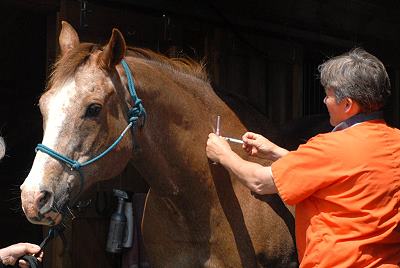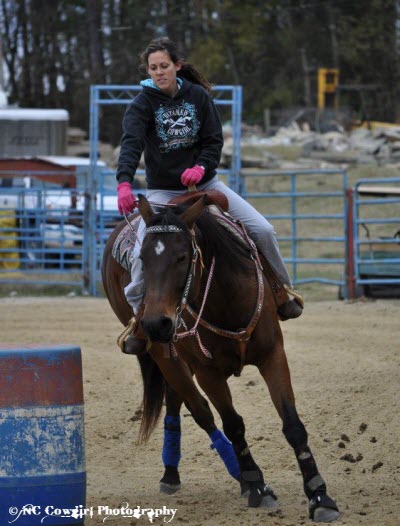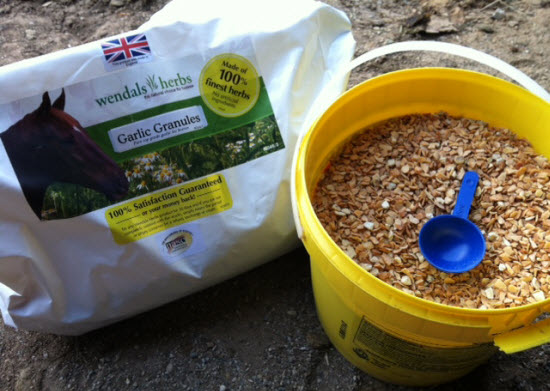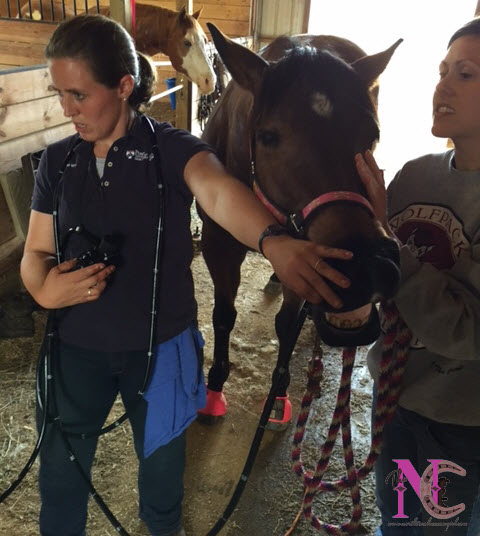Today’s post is courtesy of Dr. Joan Norton and is about giving your horse shots yourself. Hope you enjoy it.
_____________________________________________________
It happens every day in barns all over the world, horses being injected with medications by persons other than their veterinarian. It’s a characteristic that makes horsemen unique among companion animal owners. Horse owners and trainers have far more knowledge about the health and well being of their animals than your average dog or cat owner. Not many people give their cats injections (unless they are diabetic) and no one keeps a giant bottle of Rimadyl in the cabinet just in case Fido gets a little sore after your weekend hike, but horsemen routinely give their horses medications – everything from wormers to joint supplements – without the express direction or consent of a veterinarian.
For the most part, nearly 99.9% of the time, everything works out just fine. The caregiver knows how the medications work, how to safely administer them and the horse couldn’t tell the difference between a DVM and the DMV anyway. Problems occur, however, when medications are abused, technique is faulty and education is lacking. Injections meant to go intravenously (IV) can accidentally get into the surrounding tissue, causing inflammation, necrosis and sloughing of the neck. Intracarotid injections send the drugs straight to the brain causing immediate seizure and sometimes death and substances intended to be placed in the muscle, when given IV can cause the same reaction.
In our industry we further complicate matters by having third party persons involved in these acts, a trainer or manager is making the medication decisions, not the owner and sometimes (whether intentional or not) these choices are not in the best interest of the horse. And in some cases a 4th party is involved when the trainer instructs a groom to administer the meds. There are no laws against laypersons administering injections to horses (with the exception of the Rabies vaccine in some states) and while there may not be criminal charges filed if an injection you administer goes wrong, there is certainly plenty of room for you to be held legally responsible. Even if you are the unlucky 4th party and had no say in the decision to use the drugs. Whether there is a medication error or inappropriate administration to blame, if you are the one performing the injection you can be held responsible for the consequences. Unfortunately there are currently no organizations for professional grooms that require proper education in these techniques for certification or licensure. An organized association like that would ensure standardized training and provide legal merit in the case of a true accident or anomaly, because even the most skilled and most experienced veterinarian can have a medication error from time to time but we have a degree, a license and malpractice insurance to legally protect us.
That is why it is so important to be educated and informed.
Anyone can safely give injections to a horse as long as they are properly trained. Get instruction from a licensed veterinarian or technician in the proper techniques for giving each type of injection, know what the medications are, what they are for (and I mean what they are truly designed for, and not just why you are using them) and what adverse reactions or potential side effects they could cause. Ask questions! Never give an injection if you don’t know what is in the syringe. If you don’t know what it is, how it works and what to do if something bad happens, then you shouldn’t be giving the injection. By educating yourself on the proper techniques and potential dangers of medications you can avoid doing harm and continue to care so well for the horses whose health we are put in charge of.

About the author: Dr. Joan Norton, WMD DACVIM, is the founder of the Norton Veterinary Consulting and Education Resource. She has also written a book, the Equine First Aid Handbook, to help horse owners confront common equine emergencies.





2 Comments
Weekend Cowgirl
April 11, 2013 at 1:55 pmReally good article. Thanks. Good information…
Weekend Cowgirl recently posted..Farmhouse
Ashley Agee
April 11, 2013 at 1:56 pmGlad you enjoyed it! 🙂